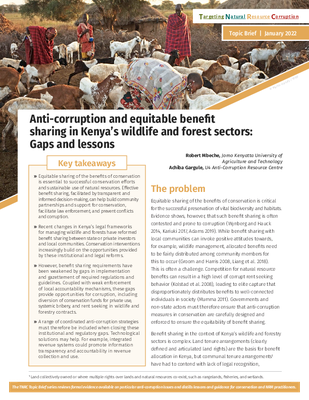Anti-corruption and equitable benefit sharing in Kenya’s wildlife and forest sectors

Equitable sharing of the benefits of conservation is essential to successful conservation efforts and sustainable use of natural resources. Effective benefit sharing, facilitated by transparent and informed decision-making, can help build community partnerships and support for conservation, facilitate law enforcement, and prevent conflicts and corruption. Recent changes in Kenya’s legal frameworks for managing wildlife and forests have reformed benefit sharing between state or private investors and local communities. However, benefit sharing requirements have been weakened by gaps in implementation and gazettement of required regulations and guidelines. Coupled with weak enforcement of local accountability mechanisms, these gaps provide opportunities for corruption, including diversion of conservation funds for private use, systemic bribery, and rent seeking in wildlife and forestry contracts. A range of coordinated anti-corruption strategies must be included when closing these institutional and regulatory gaps. Technological solutions may help.
Further details here: TNRC Topic Brief Anti-corruption and equitable benefit sharing in Kenya’s wildlife and forest sectors: Gaps and lessons | Pages | WWF (worldwildlife.org).


